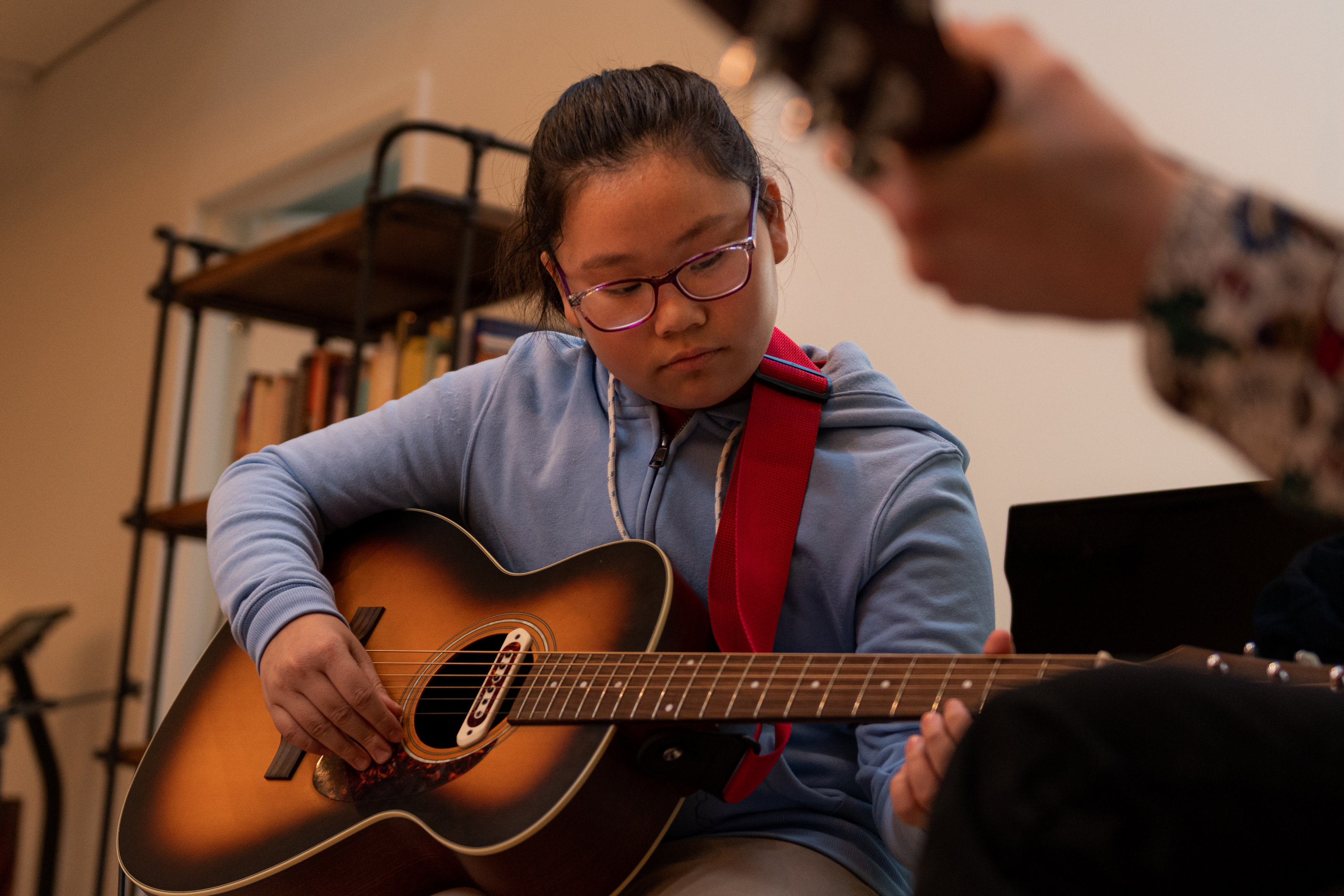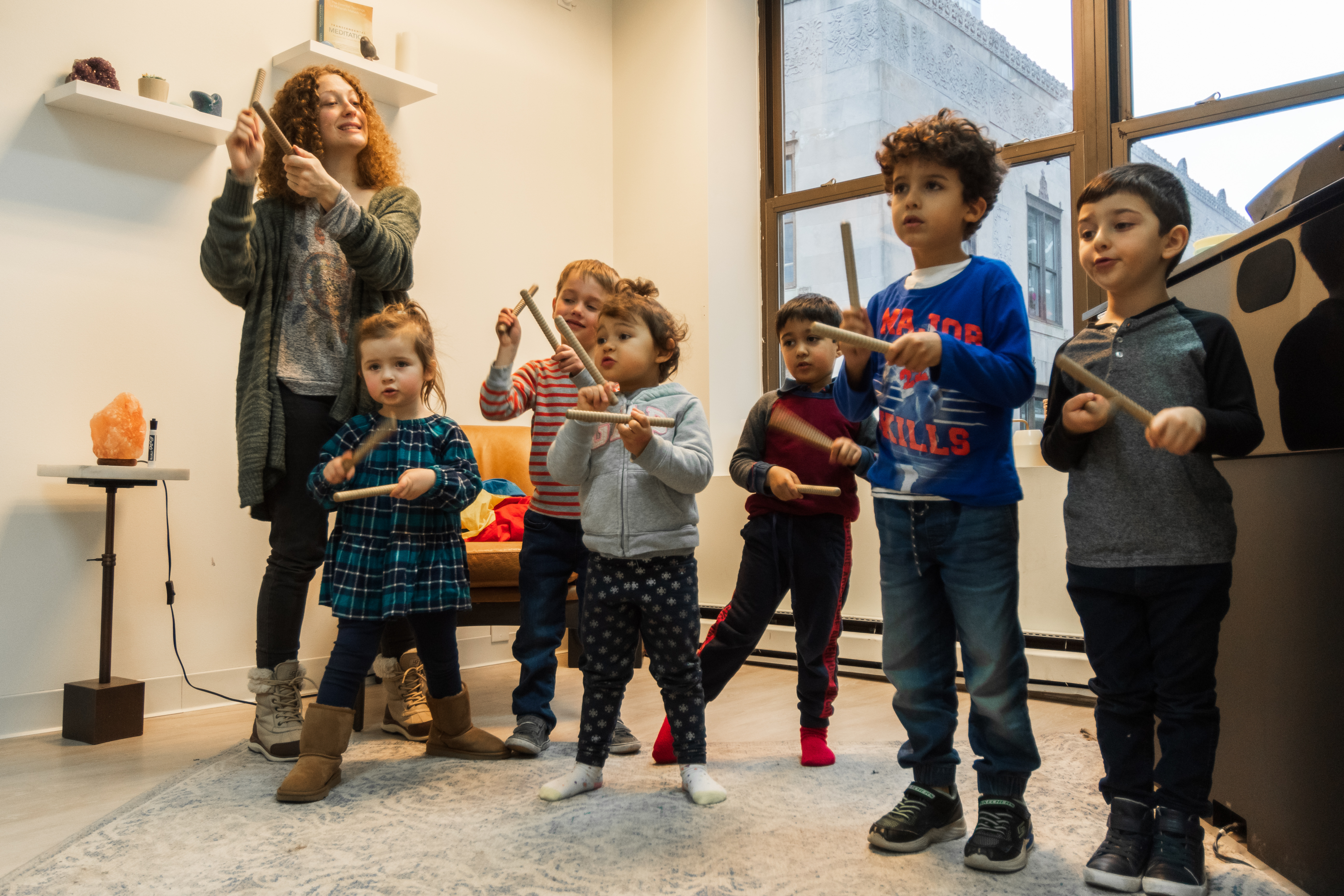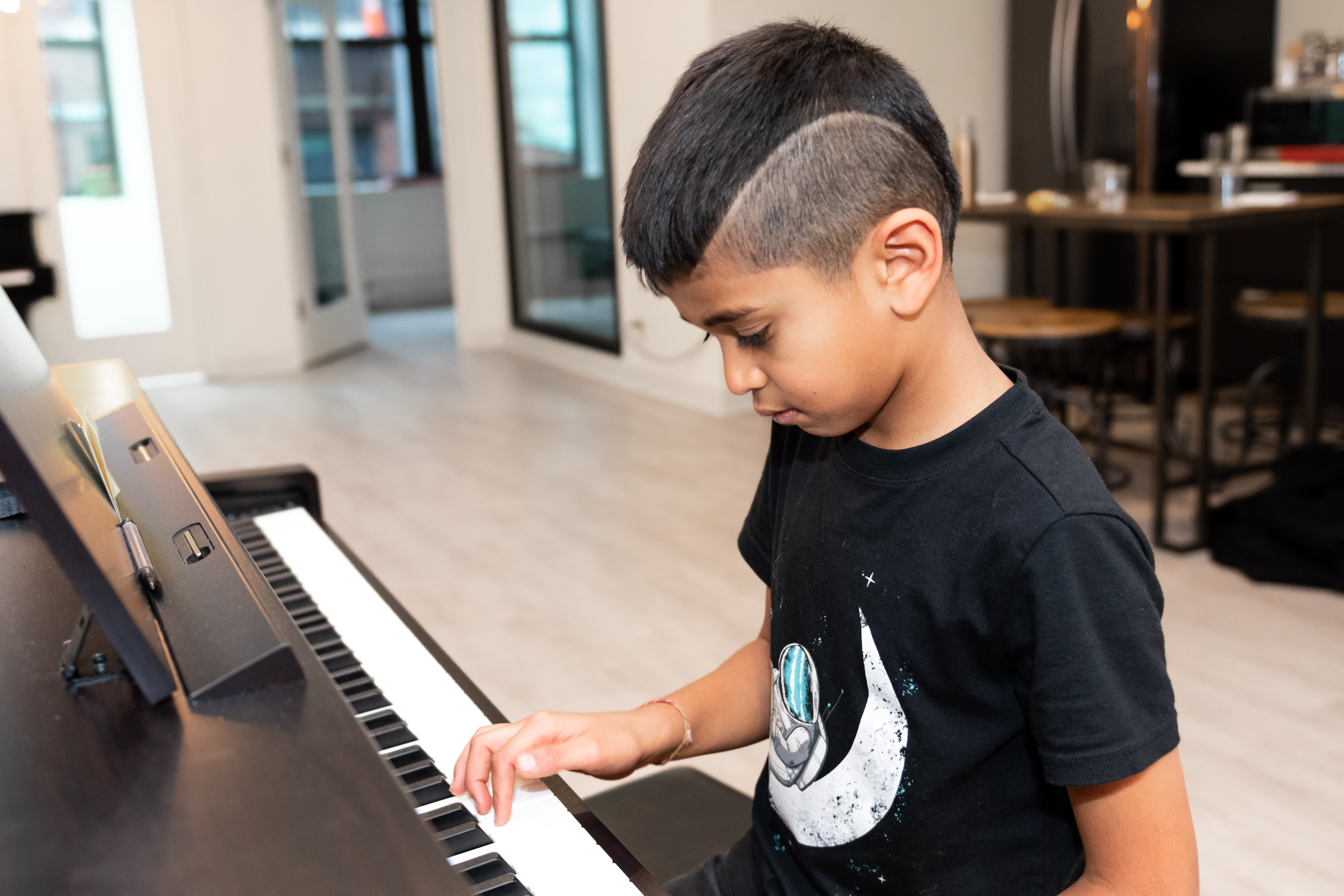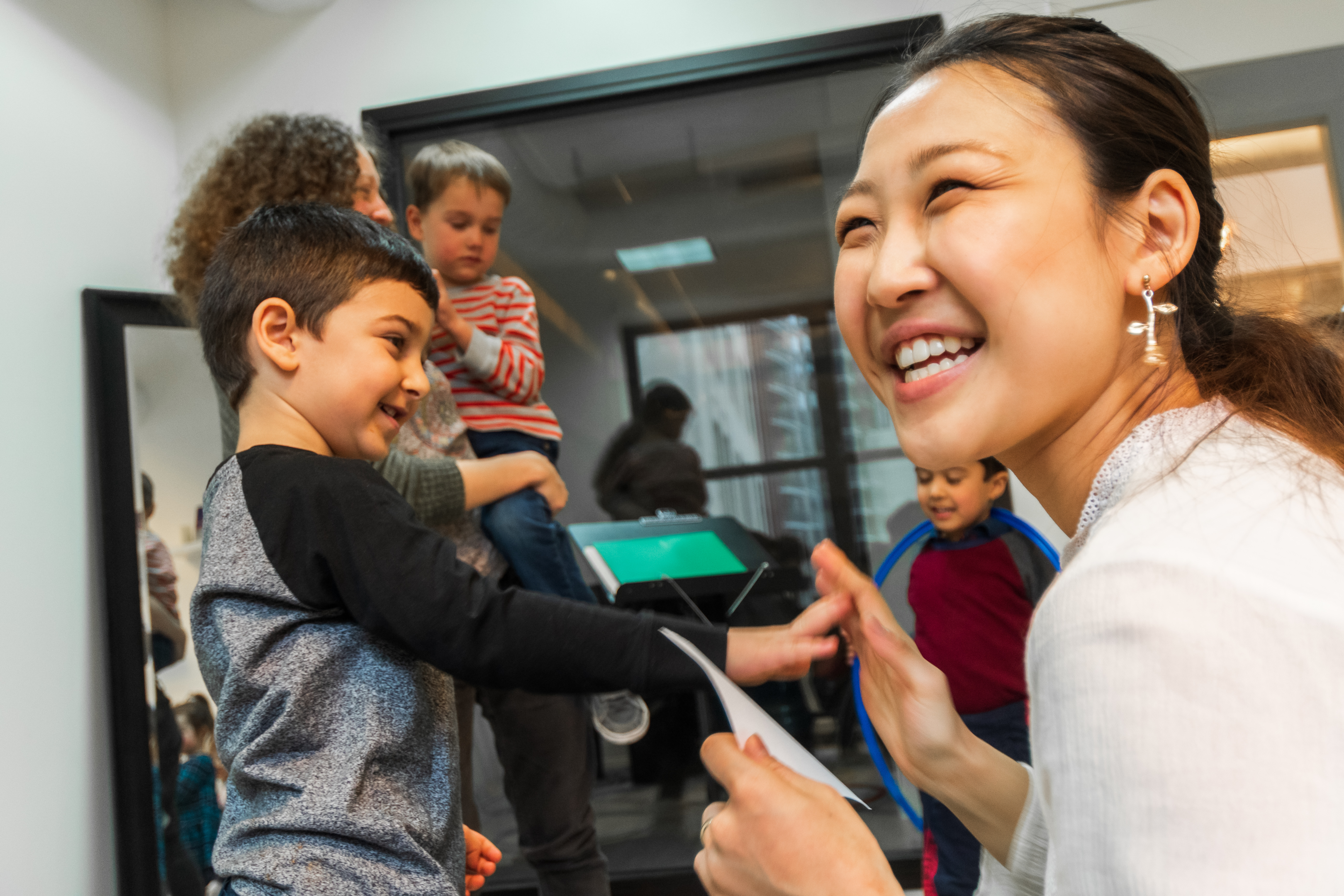Blog
How To Choose The Right Musical Instrument For My Child

Learning to play a musical instrument offers many benefits to children during their development that sets them apart from others in their age group: it enhances their language and reading skills, fine motor skills, overall academic performance, and memory. As a parent, supporting your child’s musical journey means choosing the right instrument to start them on. This might feel daunting to you amidst the sea of musical instruments out there, but fear not – we’re here to help simplify this process for you!
In this article, we’ll give our recommendations on when is the right age for your child to begin lessons on an instrument, and what we consider to be the best musical instruments to start on.
What’s The Best Age To Start Playing An Instrument?
Most research suggests that, developmentally, age 5 is a widely accepted benchmark for children to pick up their first instrument, stemming from the belief that during early development, most children don’t have the physical capabilities or the focus they would need to tackle any instrument. Before this age, your best bet would be to expose your child to as much music as possible (for example, playing music around the house or placing them in early childhood music lessons).
Not All Kids Develop The Same
That being said, the different developmental stages for young kids are very fluid. Early education is not one-size-fits-all, and decisions regarding children’s musical programming are made on a case-by-case basis.
In fact, we’ve learned from our experience at Musicians Playground that our kids are often ready to be exposed to learning instruments such as Piano or Ukulele as early as 2 to 3 years old. By using an approach that combines early instrumental exposure with the teaching of foundational aspects of music such as singing, rhythm, steady beat, movement, expression, and listening – we found that the kids are ready to play an instrument at a younger age than widely prescribed.
This is a huge advantage when it comes to your child’s music education in the future – when other children might only start out on their instrument, your child will already have some skills on the same instrument, as well as a basic understanding of musical theory, having already been exposed to sheet music.
Irrespective of your child’s age, though, integrating singing into their music lessons from the start is crucial for developing their auditory memory and priming their musical ear for when they start focusing on their chosen instrument. While a young child isn’t physically developed enough to have proper “voice lessons”, singing while learning will make learning to play any instrument a much more rewarding experience for them. They can sing and play at the same time, and they’ll better understand complex concepts and melodies if they’re able to replicate them vocally.
The Best Musical Instruments For Younger Children To Start With

Now that we’ve discussed the right time to expose your child to a musical instrument, let’s talk about how to choose the best instrument for them to start learning on. Here are some of the factors you should consider:
Your Child’s Physical Compatibility With The Instrument
While passion for a specific instrument is a great indicator of what the right musical instrument for your child could be, their physical abilities can’t be overlooked. For example, young kids might really want to play wind or brass instruments, but they just don’t have the lung capacity to be able to tackle them yet, nor the physical strength to hold the larger instruments (like a tuba or a saxophone) upright.
Conversely, smaller instruments (like a ukulele, which can be ideal for a small child due to its size and soft nylon strings) – might not be satisfying enough for a teenager. They might want to take on other string instruments, like a guitar or bass, that are larger and have a deeper timbre.
In our experience, younger children do better starting out on instruments like the piano, ukulele, or small percussion instruments like hand drums, shakers, and rhythm sticks, as they are easier to handle, allowing your child to get good really fast. Playing an instrument that is compatible with your child’s ability is the key to fostering a life-long love of music and motivation to keep learning music in the future!
Your Child’s Personality
Even at a young age, it can become evident to your child’s music teacher during private lessons or music lessons in elementary school whether or not they show a preference for a specific timbre or sound. The teacher will be able to tell you if your child gravitates towards a particular instrument out of the different instruments they’ve been exposed to, and they can make suggestions for you regarding selecting an instrument for your child.
Another way to gauge your child’s interest level in a musical instrument is to look for what musical styles they like: Maybe they hear gorgeous melodies being played on the piano and decide they want to start learning piano. Maybe their favorite singer also plays the guitar, and your child wants to emulate them.
Have instruments at home? If not, it could be a good idea to purchase a few different instruments and see what your child naturally gravitates towards. Keep in mind an awesome benefit Musicians Playground members receive is exclusive discounts with major instrument retailers. So be sure to let your Musicians Playground teacher or account manager know you’re looking to purchase before you do so they can help you get the best deal possible.
Let Your Child Decide
Finally – you could ask your child what they’d like to learn! Letting children decide on their starter instrument gives them a sense of autonomy and responsibility, increasing their motivation to practice. If they’re having trouble making up their mind, you could try offering them a choice between 2 or three instruments, based on their teacher’s suggestions, to make the decision easier for them.

What If My Child Wants To Switch Instruments?
Switching instruments is fairly common for many budding musicians. If your child wants to switch to another instrument, it’s important to think about these things:
Their Reason for Switching: Start by having an open conversation with your child. Understand the reason behind the desire to switch. Is it due to a genuine interest in other instruments, frustration with the current one, peer influence, or perhaps some other reason? Knowing the reason can help guide your decision.
Initial Investment: If your child has just started learning their current instrument and hasn’t invested much time or effort, switching may not be as big a deal. However, if they’ve been playing for several years and achieved a certain level of proficiency, it might be worth staying with their current instrument, considering the amount of time and effort already put into it.
Skill Transfer: Some skills can be transferred between instruments, especially within the same family. For example, switching from the ukelele to the guitar might be smoother than switching from the ukelele to the piano. Understanding the similarities and differences can help manage expectations regarding the learning curve of the new instrument.
Passion vs. Persistence: Switching instruments can be motivated by a genuine passion for a different sound or style. In fact, in some cases, when a child hits a motivational block, exploring a new instrument might be just the thing to revitalize their love for their current instrument. On the other hand, frequently changing interests can also be an avoidance strategy in the face of challenges. It’s vital to distinguish between the two.
Teacher’s Input: Discussing the switch with your child’s current music teacher can offer valuable insight. They can provide feedback on your child’s progress, strengths, and potential in the context of the current instrument. They might also recommend teachers for the new instrument if the switch is deemed appropriate.
Trial Period: Before committing to the new instrument fully, consider a trial period where your child can dabble with the new instrument while maintaining some practice with the old one. They can experiment in the Musicians Playground studio on the piano, guitar, ukelele, or cajon. It might also be worthwhile to invest in a few affordable starter instruments for your child to explore outside of the studio. This way, they can get a feel for the new instrument without completely abandoning the old.
Long-Term Commitment: Discuss the long-term commitment of learning a musical instrument with your child. Learning an instrument is a journey, and each one has its challenges. Make sure they understand that switching instruments won’t necessarily make the music education journey easier, but it might make it more enjoyable if it aligns better with their interests.
Musical Growth: While some might view switching instruments as a hindrance to a musician’s growth, others see it as broadening one’s musical horizons. Many accomplished musicians have dabbled with or even mastered multiple instruments throughout their careers. Use the switch as an opportunity to apply different aspects of music theory, even encourage composition!
While switching instruments can come with its challenges, it’s perfectly okay to switch if the reasons are well-considered. The ultimate goal should be to nurture a lifelong love and appreciation for music, no matter what your child decides to play. If switching instruments serves that purpose, it can indeed be a positive step in your child’s musical journey.
How To Start Lessons On An Instrument For Your Child
So, we’ve thought about the right age to start learning to play instruments and talked about the considerations to take during instrument selection. But what’s the right way to gear your child’s programming towards lessons that solely focus on their chosen instrument?
Start With General Music Lessons
The first step towards helping your child learn to play an instrument is to enroll them in a music lesson as early as Pre-K age. At Musicians Playground, we use the Pre-K lessons to provide the child with the early foundational aspects of music theory that they’re needing in order to be fully ready to jump into instrumental study at the age of 5-6 years old.
During the lesson, we guide the child to explore various timbres and instruments while priming their musical ear. This approach will also give their teacher time to asses their musical talent, and to see if they gravitate towards one instrument or the other. If there is a noticeable preference, the teacher can let the parent know.

The Shift To Purely Instrumental Lessons
At around the age of five, the child would be ready for purely instrumental lessons. These would still include some foundational aspects but will have a more intensive focus on the instrument that the child chooses, like piano or ukulele. This way we work to ensure a smooth shift from a lesson on mostly foundational aspects and early childhood music principles to a more formal instrumental lesson.
By using this approach, we’ve noticed that young children who’ve completed our Pre-K program become much more adept at learning an instrument because they have had a couple of years to marinate in those early childhood music principles.
Ready To Play?
As you can see, deciding on the right instrument for your child is a blend of intuition, observation, and sometimes, a bit of trial and error. What truly matters is the environment you create for them around this decision. With patience, encouragement, and the right guidance from your child’s instructor, you can set your child up for success on their musical journey, nurture their talents and foster their creativity. Hopefully, this article helped you with your decision in some way.
If you’re reading this because you’re looking for lessons for your child, and you need assistance with this process, we’re happy to assess your child at Musicians Playground and give you our recommendations. Book a call with us and we’ll get you started!
Stay Connected
If you like our educational content, be sure to sign up for our mailing list! We publish 2 new articles monthly in our MP community newsletter, as well as keep our members updated on upcoming events around the studio. We hope to see you soon at Musicians Playground – Boston’s #1 club for music lovers!

